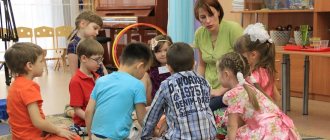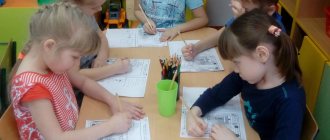Features of moral qualities of preschool children
- Humanity means sympathy, empathy, responsiveness, compassion. Therefore, an indicator of the formation of a personal quality is the nature of the attitude towards people, nature, and oneself. The humanity of a preschool child is based on the ability to understand another, to transfer the experience of another to oneself. The formation of a humane attitude towards people and nature begins in early childhood. Systematic work aimed at instilling in preschoolers a humane attitude towards people and the surrounding nature leads to the formation of humanism in them as a moral quality. In other words, humanism is a qualitative characteristic of a person. At the same time, the development of humanistic feelings and attitudes is a complex and contradictory process. The ability to empathize, sympathize, rejoice, not envy, and sincerely and willingly do good develops especially in preschool age.
- Collectivism is a moral quality of preschool children based on the formation of positive, friendly, collective relationships. The main and only function of the children's team is educational: children are involved in activities that, in terms of their goals, content and forms of organization, are aimed at shaping the personality of each of them. For the formation of collective relations, the emergence of such a phenomenon as friendship is essential. Friendship, as the closest connection between children, accelerates the process of effectively perceiving social relationships. Mutual support and responsiveness are integral features of collective relationships. Children's relationships are determined by moral rules and norms. Knowledge of the rules of behavior and relationships makes it easier for a child to enter the world of his own kind, the world of people.
- Patriotism and citizenship are not yet fully formed in preschool age, but their foundations have only been laid. Therefore, education of the principles of patriotism and citizenship is one of the most important parts of the moral education of preschool children. The feeling of love for the motherland is associated with the feeling of love for the motherland. These feelings are associated with a common basis - attachment and a sense of security. Thus, if we cultivate in children a sense of affection as such and a feeling of attachment to home, then with appropriate pedagogical work this will ultimately be complemented by a feeling of love and affection for their country.
- A value-based attitude towards work is an awareness of the importance of work in a person’s life. A distinctive feature of a value-based attitude to work is that it is a moral quality of a preschooler, which integrates such moral qualities as tolerance, empathy and helpfulness. Preschoolers' attitude to work includes respect for others.
- Dialogue is the preschooler’s readiness to interact with other people, listen and understand them.
In addition, in most studies, the most important moral qualities are kindness, politeness, sensitivity, tact, modesty, helpfulness, sociability, and discipline.
As a result of the systematic formation of the moral qualities of the personality of preschoolers, their relationships with other people acquire features of a moral orientation, and the ability to manage their actions and feelings on the basis of moral requirements develops. Children's moral ideas become more conscious and play the role of regulators of children's behavior and relationships with others. Independence, discipline, responsibility and self-control are actively formed, as well as a number of habits of cultural behavior, the ability to maintain friendly and friendly relationships with peers, and to show respect and attention to elders. The foundations of social, patriotic and international feelings are developing. All this, as a rule, indicates successful moral development and constitutes the necessary moral and volitional readiness for schooling.
What it is
It has been proven that you can begin to develop morality in a toddler from preschool age, but the baby acquires some concepts even in infancy. Here a lot depends on the situation in the house, in the family.
In the case when a little one involuntarily has to witness fights, scandals, showdowns in a raised voice, then how can one expect any other behavior from him. The child always follows the example of his parents and other family members in everything.
Moral development is, first of all, a smooth psychological environment in the environment where the baby grows, where adults respect each other, children and pets.
In this case, the baby doll will take from its parents the correct manner of communicating with others.
Or, on the contrary, if there are constant conflicts in the house, adults fight and quarrel.
This means that the cub will begin to take his own, using physical force, for example, taking toys from other children, calling names, screaming. By the way: Did you know that when a mother smiles at her newborn baby, she begins to develop in him a sense of morality, equality and respect.
Option 1
At 3 years old, a little person has complete control over his actions and actions and therefore he must be responsible for them.
But how can we form a spiritual and moral education in a person, so that the baby doll knows how to behave correctly in society, and so that in adult life he has as few problems as possible and more friends?
The best option for kids would be good old fairy tales.
Think for yourself who can show an example of good and evil, good and bad, better than fairy tales. Reading fairy tales every day will help your little one analyze and draw a conclusion from what he heard over time.
Option 2
Another option is full adult supervision. Well, this is basically what mom does every day.
The parent looks at what the child is doing and says, don’t touch this, don’t say that, that’s not allowed, and so on. Whether there is any benefit is a moot point.
Of course, having received punishment for disobedience, the ward will henceforth think about doing it again or not. I give you 100% assurance that he will do it. On the other hand, he will learn to be cunning; in front of his mother, the baby will behave ideally, or close to it. But as soon as mom turns away, the baby doll does what he wants.
I think that the method with fairy tales is more effective, because he himself comes to the conclusion that doing something bad is bad (sorry for the pun). What do you think? Express your opinion on this matter.







